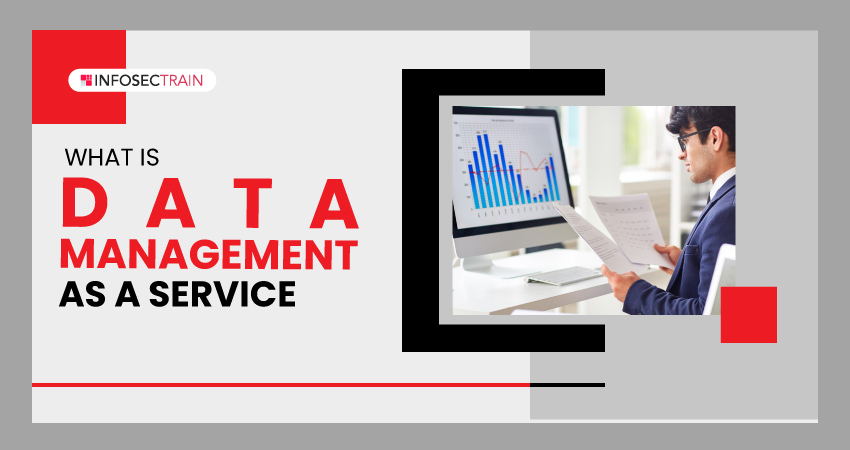What is Data Management as a Service (DMaaS)
In the dynamic world of technology and business, effective data management is crucial for organizational success. With the growing data volume, the demand for streamlined solutions intensifies. Enter Data Management as a Service (DMaaS), a transformative paradigm reshaping how companies approach data handling. DMaaS, operating on a cloud-based model, is a beacon of efficiency. By outsourcing data intricacies, businesses can unleash their data’s true potential, turning DMaaS into a strategic partner for success and innovation. As the business landscape evolves, DMaaS stands at the forefront, simplifying data management and paving the way for a future where data isn’t just managed but maximized.

What is Data Management as a Service?
DMaaS revolutionizes data handling by leveraging cloud-based services, shifting from traditional on-premise models to an agile and scalable cloud solution. It optimizes data management through cloud computing, providing organizations with a versatile and efficient means to handle their data assets. Organizations benefit from a centralized platform with DMaaS, which encompasses data storage, backup, recovery, disaster recovery, integration, governance, and analytics. DMaaS providers deliver a comprehensive suite of functionalities for streamlined data management. In essence, DMaaS is a proactive approach to centralized and cloud-powered data optimization.
How DMaaS Works?
1. Data Ingestion:Organizations link their data sources to the DMaaS platform using APIs, connectors, or data migration tools. They actively engage in data ingestion processes to facilitate seamless integration with the DMaaS platform. The connection is established through the proactive use of these methods for efficient data incorporation.
2. Data Storage: The DMaaS platform securely and scalably stores data utilizing diverse storage options like object storage, relational databases, or NoSQL databases. It ensures a robust and flexible data storage environment, safeguarding information integrity. The platform employs various storage methods to cater to data types and organizational needs.
3. Data Preparation: The DMaaS platform actively prepares data for analysis by cleaning, transforming, and enriching it. Tasks include removing duplicates, addressing missing values, and creating new features, ensuring data is optimized for thorough analysis. The platform proactively engages in data refinement, enhancing its quality and relevance for subsequent analytical processes.
4. Data Integration: The DMaaS platform seamlessly integrates data from various sources, providing organizations with a comprehensive view. Tasks include:
- Merging data from different systems.
- Matching based on standard identifiers.
- Resolving conflicts for a unified dataset.
The platform actively facilitates data integration, ensuring a cohesive and holistic perspective for organizations.
5. Data Governance: The DMaaS platform actively assists organizations in governing their data by enforcing policies and procedures. Tasks include defining data ownership, ensuring data quality, and safeguarding sensitive information. The platform plays a proactive role in upholding data governance promoting adherence to established standards for enhanced data management.
6. Data Analytics: The DMaaS platform equips organizations with various tools for analyzing their data, including tasks such as building dashboards, generating reports, and running predictive analytics models. It actively facilitates data analytics, empowering organizations to derive meaningful insights and make informed decisions. The platform is pivotal in enabling advanced analytical processes for enhanced business intelligence.
7. Data Delivery: The DMaaS platform actively delivers insights to individuals across the organization, regardless of their location. Tasks include creating reports, sending alerts, and integrating with other applications for seamless data dissemination. The platform is pivotal in ensuring efficient data delivery promoting accessibility and usability for organizational stakeholders.
Why is Data Management as a Service Important?
1. Exponential Growth in Data Volume: Data generation is experiencing an unprecedented surge, posing challenges for in-house storage, management, and analysis by organizations. DMaaS providers, equipped with infrastructure and expertise in providing scalable and secure data management solutions, ensuring organizations can navigate the complexities of storage, analysis, and management in the era of exponential data growth and offer a solution to handle substantial data volumes. This enables organizations to delegate data management tasks, allowing them to concentrate on their core business functions.
2. Rising Demand for Data-Driven Decision-Making: Organizations, regardless of size, increasingly depend on data for decision-making. This underscores the importance of having access to accurate, reliable, and timely data. DMaaS providers play a crucial role in assisting organizations in ensuring the accuracy, reliability, and timeliness of their data, thereby facilitating improved decision-making processes.
3. Growing Demand for Agility and Scalability: Organizations require swift and effortless access to analyze data to adapt to dynamic market conditions and evolving customer demands. DMaaS providers address this need by offering an array of self-service tools and capabilities, empowering organizations to swiftly and easily access and analyze their data.
4. Escalating Demand for Data Security and Compliance: Organizations prioritize strong data security and compliance procedures due to a growing risk of security events and data breaches. DMaaS providers address this need by offering a spectrum of security features, including encryption, access control, and data loss prevention, to safeguard organizational data effectively.
5. Rising Complexity of Data: The complexity of data is on the rise, characterized by diverse formats, structures, and sources. This complexity poses challenges for organizations in terms of integration and analysis. DMaaS providers step in with various tools and services designed to assist organizations in seamlessly integrating and analyzing their data, irrespective of its format or structure.
How can InfosecTrain Help?
InfosecTrain, a premier IT security training provider, delivers certified instructor-led training for professionals seeking top-notch cybersecurity education. Elevate your skills with our industry-leading courses and expert guidance. For a comprehensive grasp of container security and its foundational principles, explore InfosecTrain’s Microsoft AZ-500 Certification: Azure Security Technologies and Certified Cloud Security Professional (CCSP) training courses. The Microsoft AZ-500 course focuses on securing containers in Microsoft Azure, delving into access control, network security, monitoring, and compliance. Meanwhile, the CCSP training course provides:
- A vendor-neutral outlook.
- Encompassing containerization technologies.
- Compliance.
- Risk management in relevance to diverse cloud providers.
Enrolling in these courses equips individuals with a thorough understanding of container security from both Microsoft Azure and broader cloud perspectives.
TRAINING CALENDAR of Upcoming Batches For CCSP
| Start Date | End Date | Start - End Time | Batch Type | Training Mode | Batch Status | |
|---|---|---|---|---|---|---|
| 24-May-2025 | 06-Jul-2025 | 19:00 - 23:00 IST | Weekend | Online | [ Open ] | |
| 21-Jun-2025 | 03-Aug-2025 | 09:00 - 13:00 IST | Weekend | Online | [ Open ] | |
| 26-Jul-2025 | 31-Aug-2025 | 19:00 - 23:00 IST | Weekend | Online | [ Open ] | |
| 30-Aug-2025 | 12-Oct-2025 | 09:00 - 13:00 IST | Weekend | Online | [ Open ] |







 1800-843-7890 (India)
1800-843-7890 (India)